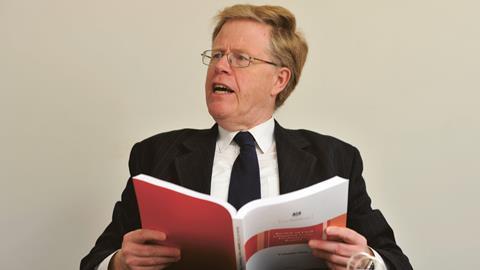Fixed recoverable costs are being expanded – and despite opposition from lawyers who accuse the government of ‘shoe-horning’ cases into a simpler system, the government appears unlikely to budge
Some solicitors had no doubt forgotten Sir Rupert Jackson’s 2017 report on fixed recoverable costs (FRC). At times it felt like the Ministry of Justice had misplaced the report, on which it consulted in 2019. So when the government announced last week that it would implement most of Sir Rupert’s proposals, there was a great deal of thumbing through the archives to find out what had actually been recommended.
The crux is that fixed recoverable costs are being expanded, and faster than most claimant lawyers would have feared. All civil claims (except clinical negligence, which has its own reform programme) up to £25,000 will be subject to capped costs. Most claims below £100,000 are likely to receive the same treatment, depending on their complexity. Jackson’s idea of a new, intermediate track for simpler claims between £25,000 and £100,000 was shelved, but otherwise his prescription has largely survived, despite somewhat dramatic changes in the landscape since 2017.
What will constitute cases suitable for fixed costs in the expanded fast track? Most of those with trials lasting up to three days or with no more than two experts giving oral evidence on each side. The allocation of cases will be left to judges’ discretion. Lawyers worried about their costs being cut will take some comfort from the inevitable stream of satellite litigation as the allocation of cases is disputed.
There were other less headline-grabbing details. The government will implement a separate grid of FRC for noise-induced hearing loss claims in the fast track below £25,000. Ministers will also push ahead with proposals to introduce costs budgeting to all ‘heavy’ judicial reviews, where costs are likely to exceed £100,000.
What comes next? The government already has an idea of what the costs should be and has committed to uprating Jackson’s figures for inflation. In terms of start date, FRC should apply to ‘as many cases as reasonably possible’, but will cover only those cases where the accident or cause of action arises after the implementation date, or in disease cases where no letter of claim has been issued before the implementation date. The government will need to engage with the Civil Procedure Rule Committee on the details, and it is unlikely that the extension will be implemented within the next year.
Unfixing legal costs was clearly not an option for the MoJ. The impact assessment states that uncontrolled costs would ‘continue to create an incentive for lawyers to undertake more work, as the cost of this can then be recovered if the case is successful’. The report is clear that legal costs are currently disproportionate.
The government accepts that lawyers will face reduced income per case, but counters this by saying that if cases are settled more quickly there will be opportunities for more cases. There is no such caveat for costs specialists, who are likely to lose work when there is greater certainty.
Several groups, including the Law Society, Association of Personal Injury Lawyers and Association of Costs Lawyers, oppose the plans, arguing they are based on scant and dated evidence, and underestimate the complexity of cases which can be worth up to £100,000. On the first point, it is notable that the government leaned heavily on data from a single firm showing the legal costs for all the cases settled between 2006 and 2017.
ACL chair Claire Green said: ‘The government needs a much more rigorous statistical base if it is to widen the use of fixed costs, and also needs to commit to regularly reviewing and updating them.’
APIL points out that employers’ liability disease claims, for example, can be highly complex, yet are likely to be subject to cost-limiting measures.
The association’s president Neil McKinley accused the government of trying to ‘shoe-horn’ cases into a simpler system for which they are not suited. ‘The Ministry of Justice has also provided little detail about how this will work, leaving it to “the parties and judges” to work out,’ he said. ‘That will take time and, until we get clarity on these matters, injured people will be subjected to a great deal of uncertainty at a time when they are very vulnerable.’
In spite of opposition, the MoJ is unlikely to budge. In 2017 Jackson described a system where costs were just a fraction of the claim’s worth as being the ‘holy grail pursued by every civil justice reformer’. For the government, that quest is nearly at an end.





































2 Readers' comments